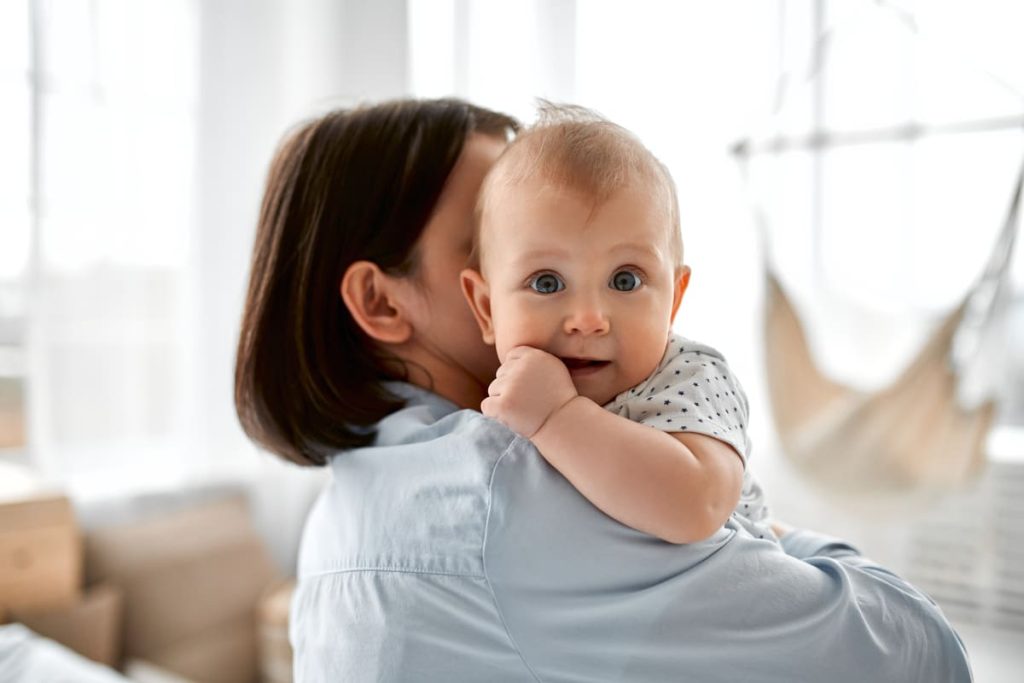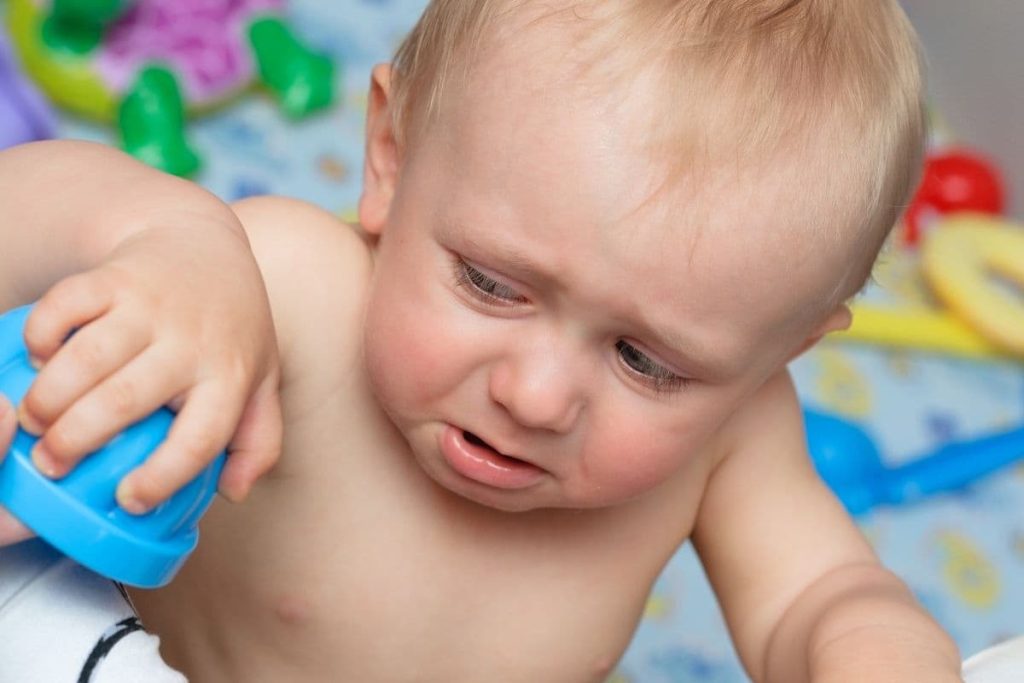When do kids say their first word? Well, language development in children is fascinating, but you have to remember that it’s a highly individual process. The utterance of their first word is a memorable milestone. Typically, this occurs between 10 to 15 months of age, although the timing can vary for each child.
Let’s check out the milestones and see what you can expect!
Key Takeaways:
- A baby’s first word is typically spoken between 10 to 15 months.
- Environmental exposure and parental interaction are crucial to help your baby learn language.
- The first word marks the beginning of a journey in language acquisition, where you can encourage your baby to progress to more complex speech.
Understanding Speech Milestones
Tracking a child’s speech and language development is important to ensuring they are on track. Speech milestones serve as checkpoints in the typical timeline of acquiring language skills, from simple sounds to saying their first words.
The progression from babbling to speaking real words is a complex transition that hinges on a myriad of factors, including the following:
- Genetic disposition
- Environment
- parental interaction
To help your baby say their first word, it’s important to encourage their efforts and be patient with their pronunciation. Eventually, they may progress to stringing together two words, marking another significant step in their language development.
Early Stages: From Cooing to Babbling

In the early stages of language development, infants as young as a few months old begin to experiment with sound.
3rd month
By 3 months, one can expect a baby to start cooing, which is the production of vowel-like sounds, often referred to as baby talk. These first noises are a baby’s way of exercising vocal cords and practicing the art of communication, making it easier for babies to transition to actual words.
6th month
As they approach 6 months, these sounds evolve into babbling—stringing together vowels and consonants (like “ba-ba” or “ga-ga”), a stage where babies understand the basic elements of speech.
Babbling to First Words: The Developmental Leap
Babbling is pivotal; it represents a developmental leap where infants begin to refine sounds that are critical to forming words later. This period is essential for babies and toddlers as the words they produce start resembling actual speech, paving the way for the baby to talk. During this phase, the child develops an understanding of language rhythms.
7th month
However, if there are no words yet by around 7 months, it could be an early sign of autism spectrum disorder or hearing loss, and consulting a professional for potential speech therapy might be beneficial.
9th month
By 9 months, babies often begin to pronounce words more clearly, a development recognized by the American Academy of Pediatrics.
The Significant One-Year Mark
12th month
Reaching 12 months is a significant speech milestone. Most children will likely say their first real words around their first birthday, a stage where they may say a few words within the typical age range. These are generally simple and comprise concrete objects or important people in their lives, such as “mama” or “dada.” It’s worth noting that language development varies.
18th month
Some children may begin speaking a bit earlier or later, with many continuing to expand their vocabulary of words and phrases up to 18 months and beyond, a process known as learning to talk.
Factors Influencing Language Development
When it comes to the first word a child says, several factors come into play, all of which are crucial for language development. These include a blend of genetics, environmental influences, and the frequency as well as the quality of interactions with caregivers.
Understanding how babies learn to talk and recognizing the importance of speech and language milestones can be integral in this process.
The Role of Genetics and Environment
Genetics sets the stage for a child’s potential in language development. It determines aspects like the predisposition to articulate and understand certain words. Some kids might simply be hardwired to develop language skills earlier than others. As a result, it enables them to say a word or one or two words more quickly.
However, the environment is equally influential. Children thrive linguistically in environments rich with sounds, words, and sentences.
Child development experts emphasize that consistent exposure to language through books, conversations, and singing songs can accelerate a child’s verbal abilities. This often leads to their first babies listening and eventually, babies say their first words around 12 months.
- Genetic Factors: Inborn potential for language acquisition
- Environmental Factors: Exposure to language and sounds
Impact of Interaction and Communication

The quality and amount of interaction between a child and their caregivers are pivotal for language development. Engaging in babbling and cooing back and forth with infants is a form of early dialogue that promotes their understanding of communication.
hand gestures and facial expressions
Every child develops at their own pace, and this interaction can help them understand what your child is trying to express. Hand gestures and facial expressions also support comprehending and developing language before certain words are fully formed.
Speech-language pathologists point to the importance of celebrating and responding to language milestones, which encourages little ones to continue practicing their skills, recognizing that the need to speak and the ability to say a word can vary from child to child.
Interaction and Communication Techniques:
- Babbling and Cooing: Encourages the practice of early speech sounds
- Gestures: Helps children understand intent and meaning before words
- Responsive Dialogue: Solidifies language concepts as children start babbling and using early words
By weaving together genetics and nurturing environments, complemented with rich interaction, children’s language development can be supported effectively.
KinVibes Pro-Tip: Parents eager to foster their child’s first words can consult with speech-language pathologists for tailored strategies that cater to their child’s unique needs and milestones.
Recognizing and Encouraging First Words

Navigating the exciting journey of a child’s language development means being attentive to their progress and creating an environment that nurtures their growing skills. The first words are a major milestone, but they also require encouragement and recognition to flourish into a rich vocabulary.
Identifying Common First Words
Babbling transitions into the phase where children begin to form recognizable words. Typically, this involves simple nouns and verbs that they are frequently exposed to. Nouns like “mama,” “dada,” and “ball” often emerge because they are part of everyday interactions.
- Common First Nouns: mama, dada, baby, ball, dog
- Common First Verbs: go, see, eat
Enhancing Vocabulary Through Repetition
Children learn through repetition, which reinforces their understanding and usage of words. Repetitive reading and engaging in conversations where similar words are used frequently assist in embedding vocabulary into a child’s language repertoire.
Parents can focus and create repetitive exercises to develop a balance in their speech such as:
- Nouns
- Verbs
- Pronouns
- adjectives
at age 2
Around age 2, children begin to understand objects and their names more clearly. Focusing on nouns, verbs, pronouns, and adjectives during repetitive exercises aids in developing a balance in their speech language.
| Activity | Example |
|---|---|
| Reading | “The dog runs. The cat runs. See them run!” |
| Speaking | “Do you want to eat? Yes, you eat.” |
The Role of Parents in Language Acquisition
Parents play a critical role in their child’s language acquisition by responding to attempts at words and engaging in meaningful conversations. Encouragement is paramount; even when a child uses a word incorrectly, parents should acknowledge their effort and gently correct them.
- Encouragement Example: Child says “milk.” Parent responds, “Do you want some milk to drink?”
- Conversational Example: Parent says, “Look at the red ball. Can you say red ball?”
If your baby doesn’t seem to progress or you notice any of the following concerns, it’s a good idea to talk to your pediatrician. Parents should also expand on single words, turning them into simple phrases to model how words can be combined.
Addressing Speech and Language Delays

When a child isn’t developing speech and language skills on schedule, caregivers must take timely action. This usually involves consulting medical experts and initiating special intervention strategies.
Consulting with a Pediatrician
It’s a pediatrician’s role to monitor a child’s growth, which includes speech development. If a caregiver notices a speech or language delay, they should consult a pediatrician.
The baby will likely undergo a hearing test to rule out hearing problems and ensure the child’s ears are functioning properly, as hearing issues can impact speech.
Before age 5, addressing any concerns is essential, as this is a critical period for language development. The American Speech-Language-Hearing Association (ASHA) recognizes that early detection and intervention are key to helping children with speech delays.
Intervention Strategies from Speech-Language Pathologists
If a speech delay is identified, a pediatrician might refer the child to a speech-language pathologist. These healthcare providers specialize in assessing and treating speech and language skills.
therapies
- Exercises to strengthen the muscles involved in speech
- Activities to improve the clarity of speech
- Techniques for understanding and using language
Alternative communication methods
- Sign language
- Picture boards
These professionals devise tailored strategies to address the unique needs of each child, thus fostering better language acquisition and communication skills.
Beyond First Words: Toward Complex Speech

After babies articulate their first precious words, the journey toward more complex speech gains momentum rapidly, with milestones such as phrases, sentences, and an understanding of grammar and syntax defining the progression.
Progression to Phrases and Sentences
Once a baby begins to string words together, typically around the age of 2, we see the emergence of simple phrases.
For example, after first words like “mama” or “dada,” a baby may start combining words, resulting in phrases like “more juice” or “all gone.”
Around this stage, the Mayo Clinic notes that toddlers start to grasp spatial concepts and might say “in cup” or “on table.”
at age 3
Talking in sentences becomes more apparent as they approach the age of 3. The language explosion phase kicks in, where vocabulary expands, and children begin forming longer sentences.
It’s common for these sentences to lack complexity initially, but one can expect sentences like “I go park now” to evolve into more sophisticated structures over time.
Understanding Grammar and Syntax
As children’s sentences grow, so does their grasp of grammar.
They start experimenting with adding “-s” to words to indicate plurals and employing basic tense forms to convey when something happened. While their speech might still sound simplistic, they begin to absorb the rules of language.
preschoolers
Preschoolers start using more complex sentences, often including conjunctions such as “and” or “because,” indicating an improving understanding of syntax, which refers to the arrangement of words to form proper sentences.
toddlers
From the utterance of those initial, impactful first words, toddlers’ language skills progress remarkably, following a natural expansion into phrases and sentences before delving into the intricacies of grammar and syntax.
Frequently Asked Questions
What’s the typical age for babies to start forming words?
Most babies start forming words with meaning between 9 and 14 months of age. Some may begin slightly earlier or later, which is generally considered normal.
At what age can a child usually say ‘mama’ and ‘dada’ with intention?
Children can usually say ‘mama’ and ‘dada’ with intention around their first birthday, though the timing can vary widely among different children.
Can babies actually say words as early as 6 months old?
It’s unlikely for babies to say recognizable words as early as 6 months old. At this age, they typically start to babble, which is an important precursor to speech.
What’s the record for the youngest baby to ever talk?
Records concerning the youngest baby to ever talk are not typically maintained due to variability in what constitutes ‘talking’ and the anecdotal nature of parent reports. Most documentation starts with milestones reached at a more typical developmental age.
What are the expectations for a one-year-old’s vocabulary?
By one year of age, many babies may begin saying simple words like ‘mama’, ‘dada’, or ‘bye’. Each child’s vocabulary varies; some may only have a few words while others may have several.
How soon do infants usually begin to speak clearly and form sentences?
Infants typically begin to speak clearly and form simple sentences between 18 months and 2 years old. Clarity and complexity of speech will improve with age and development.
wrapping up – CAPTURE THAT MOMENT AS YOUR BABY SAY THEIR FIRST WORDS
The journey of language development in children is a truly magical experience. As parents and caregivers, understanding when and how a baby might say their first word is crucial. While the typical age for a baby to utter their first words is between 10 to 15 months, every child’s development is unique. The sounds your baby makes evolve from simple cooing to more complex babbling, setting the foundation for their first four words and beyond.
Remember, the first words your child speaks are just the beginning of an incredible journey of language and communication. It’s important to celebrate these milestones, whether it’s a simple “mama” or “dada”.






